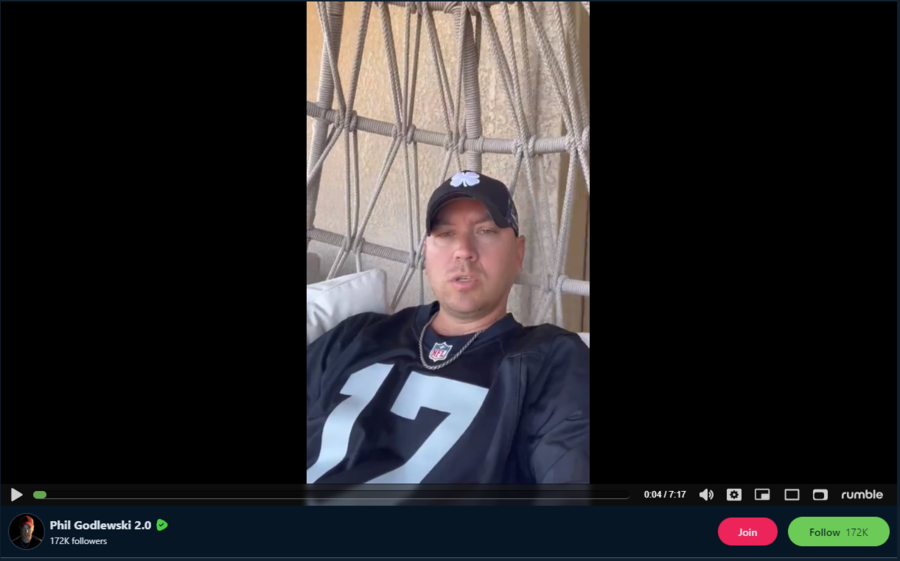STORY UPDATED: check for updates below.

Did the U.S. Supreme Court overturn the 2020 general election and award the presidency to Donald Trump? No, that's not true: The Supreme Court does not have the authority to overturn a general election or unilaterally award the presidency to a candidate. The election outcome is typically determined by the Electoral College, following elections at the state level, and is then certified by Congress.
The claims appeared in a video on Rumble (archived here) published by QAnon conspiracy theorist Phil Godlewski on July 6, 2022, under the title "Continuation of July 6th Livestream (intel drop)." The description for the post says:
Sorry guys. Obviously, [they] didn't want me to tell you this.
This is what the post looked like on Rumble at the time of writing:
(Source: Rumble screenshot taken on Tue May 16 16:33:16 2023 UTC)
A slightly shorter version of the video was published to Facebook on May 15, 2023, under the title "Psychological Ops or Truth... Anyone have proof of this?" The second video appears below:
The video
The Rumble version of the rambling video clocks in at more than seven minutes with Godlewski asserting that the 2020 election has been overturned. At the 2:51 mark, he lays out his main points:
Donald Trump has been awarded the presidency of the United States as the secondary runner-up in the fraudulent election to Joe Biden. There will be no special election. The presidency will simply be handed to Donald Trump. This is not a potential path of what could happen related to the election fraud. This has happened.
This case has been in front of the Supreme Court since the very beginning of all of this. Evidence has been presented to the Supreme Court in secret. There was a docket that was secret that no one knew about ...
The 2020 general election for presidency of the United States has been overturned due to election fraud. We will never be in this situation again. Donald Trump will return to power and that's when big things start happening.
The law
D. Theodore Rave, a constitutional law expert and professor at the University of Texas School of Law, told Lead Stories in a May 16, 2023, email that the "video is nonsense." He said the claims in it fail on at least two major points:
The Supreme Court does not hear secret cases on hidden dockets. In the rare event that the Supreme Court has to hear a case involving classified information that could not be made public, the case would still be publicly docketed with an indication that some filings were made under seal.
On the second point, Rave added:
Beyond that, the Supreme Court lacks the power to 'overturn' an election. There is no legal or constitutional mechanism for the Supreme Court to remove a president who has been inaugurated, nor is there any mechanism for the court to 'reinstate' a former president. Most of the other claims in this video are too outlandish to merit a response.
In a May 17, 2023, email to Lead Stories, Eric Berger, a Constitutional law professor at Nebraska College of Law, agreed, saying, "The Court can't secretly decide a case that no one knows about." He continued:
The Court does decide some 'shadow docket' cases without full briefing and without oral argument. However, those cases are still on the Court's docket. They are not secret; they are just decided quickly and without benefit of oral argument. Nor does the Court have the authority just to decide to overturn a presidential election. It can review legal issues that arose (such as those that arose during the recount in Florida in 2000 in Bush v. Gore), but it can't just look at an election and decide to undo it.
Presidential election
The process of electing a U.S. president is enshrined in the U.S. Constitution. The Electoral College is the formal body that elects the president and vice president. It's not decided by the popular vote. The official USAGov website spells out the process:
How does the Electoral College process work?
- After you cast your ballot for president, your vote goes to a statewide tally. In 48 states and Washington, D.C., the winner gets all the electoral votes for that state. Maine and Nebraska assign their electors using a proportional system.
- A candidate needs the vote of at least 270 electors--more than half of all electors--to win the presidential election.
- In most cases, a projected winner is announced on election night in November after you vote. But the actual Electoral College vote takes place in mid-December when the electors meet in their states. ... [The votes are then formally counted on January 6 during a joint session of Congress.]
How to change the Electoral College
The Electoral College process is in the U.S. Constitution. It would take a constitutional amendment to change the process.
Despite claims of widespread election fraud in the 2020 election, there is no credible evidence backing such claims. Joe Biden remains president of the United States.
Other Lead Stories fact checks related to Electoral College claims can be found here.
Other Lead Stories fact checks related to 2020 election claims can be found here.
Updates:
-
2023-05-18T14:57:16Z 2023-05-18T14:57:16Z Adds comments from Nebraska College of Law professor Eric Berger. Edits for context and clarity.


















